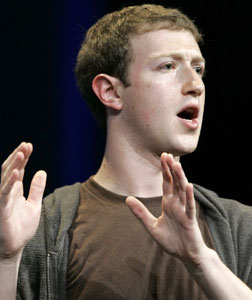The worst-hit companies are the smallest—the startups that are the star players in the Valley's recurring tragedy of flameout and rebirth. With the market down and the financial sector in distress, startups that launched with only the haziest plans for making money now have nowhere to go. Young entrepreneurs flock to Silicon Valley to win billion-dollar IPOs or to sell out to Google or Microsoft for huge sums, but neither option is feasible anymore. Now startups have to think of other ways to make money. The bad news is that the Web economy is dominated by advertising dollars, and advertising often suffers during a recession. So what to do? In the absence of ads, an IPO market, venture capital funding, and guaranteed acquisition, how can startups make any money?
Allow me to propose something crazy. Tech companies should start charging people to use their services. No, seriously. Let's take the biggest example of a Web site that has no clear path to profitability: Facebook. The social network attracts more than 100 million "active users" around the world, but as of now—as even its founder Mark Zuckerberg admits—it's still looking for a "business model" (that is, a way to make tons more money than it spends).
But let me say that again: 100 million people use Facebook regularly. Judging from some of the folks in my social network, a sizable minority of Facebook users have hundreds of "friends" and check in to the site multiple times a day—call them superactive users. Let's imagine that Facebook became a tiered service. A free plan would limit you to 200 friends, one status update per day, or some other non-Draconian combination of restrictions. But for $5 a month, the limits would be lifted. Certainly, many users would balk; tens of thousands would join Facebook groups to protest the new pay model. Let's assume that 95 percent of users will refuse to pay a dime. That still leaves 5 percent, or 5 million people, to pay $60 a year. That's $300 million in the bank.
"We've found out that having a price is really cool for making profits," Hansson pointed out last spring in an entertaining presentation called "The Secret to Making Money Online." "You have customers, they pay you money for the product or service, and you get profits! It's almost too simple to work." Of course, 37signals didn't come up with this idea on its own, either: "I've heard that over time—hundreds of years actually—this has been how most businesses have made their money. But somehow that notion got lost in the Web world."
But wait a minute, you might be thinking. That can't really work—perhaps Facebook can make a few hundred million dollars a year by charging people to use its site, but Facebook's investors have valued the company at $15 billion. Facebook harbors Google-like aspirations of changing every facet of society—by mapping our social relationships, it aims to alter how we make friends, how we do business, how we understand the world around us. That sounds like a very grand plan, a plan that deserves to make billions—not just a few hundred million.





3 comments:
aku juga punya facebk,tapi jarang aku aktifin,hi..hi..
aku bulan lalu bikin facebook tp gak ada foto apa2 hehe... FS malah banyak :D
hi... bagus ya...
Post a Comment